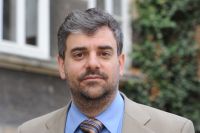 Prof. Dr. Heinz Rothgang
Prof. Dr. Heinz RothgangThis year, the German Innovation Funds has provided research funding to the tune of € 300m. Of that money, € 225m. have been awarded for the implementation of new healthcare models, and €75m. for research on health services research. Around 600 applications for research funding were submitted; 62, that is one in ten, projects were approved. One of the grants was awarded to SOCIUM.
The primary aim of the project submitted by Professor Rothgang (SOCIUM) and his team is to gain a better knowledge of needs-based medical care by general practitioners and medical specialists to nursing home residents with a view to improving the needs-based provision of medical care in that setting.
The three-year project, with a total funding volume of € 854,905, will be conducted by SOCIUM in cooperation with the Institute of Public Health and Nursing Research (IPP), the Competence Center for Clinical Trials Bremen (KKSB) and the Scientific Institute of the AOK Health Insurance Fund (WidO), and with the participation of the AOK Health Insurance Fund Bremen/Bremerhaven, the Bremer Heimstiftung (a foundation that runs over 20 residential/nursing homes in Bremen), the Federal Association of Private Providers of Social Services (bpa), the Bremen Association of Social Welfare Organisations (LandesArbeitsGemeinschaft der Freien Wohlfahrtspflege Bremen/LAG) and the Bremen Association of General Practitioners (Hausärzteverband).
In a first step, routine data from the statutory health insurance funds will be examined to compare and identify differences between medical care provided by GPs and specialists to (i) nursing home residents, (ii) people in need of long-term care who are cared for in a community setting and (iii) patients not requiring long-term care. Any differences in provision will then be assessed in terms of over-, under- and misprovision by means of standardised assessment using primary data. Appropriate (or inappropriate) medical care provision is explained on the basis of a record linkage and retrospective analysis of routine health insurance data and primary data, as well as case reconstructions. In focus group discussions, potentials for improvement and possible solutions are then extrapolated from this unprecedented survey and analysis of deficits in medical provision. Building on this, the Delphi method is then applied to develop and pilot a model project. Altogether, the project should contribute to an improvement in the needs-based provision of medical care in nursing home residents.
More information about the projekt:
Needs-Based Provision of Medical Care to Nursing Home Residents (MVP-STAT)
Contact:
Prof. Dr. Heinz Rothgang
SOCIUM Research Center on Inequality and Social Policy
Mary-Somerville-Straße 3
28359 Bremen
Phone: +49 421 218-58557
E-Mail: rothgang@uni-bremen.de











